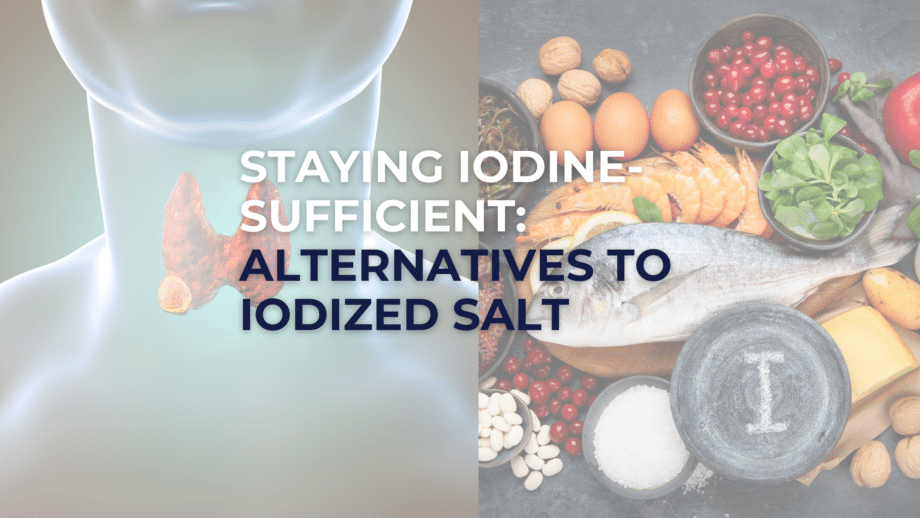Many health-conscious individuals have turned to sea salt and pink salt for their mineral benefits. However, these salts often lack iodine, a crucial nutrient for thyroid health. In this guide, we’ll explore various ways to get iodine outside of salt, ensuring you meet your dietary needs without compromising on flavor.
Why Iodine Matters
Iodine is an essential trace mineral necessary for the production of thyroid hormones. These hormones regulate metabolism, energy production, and even play a role in brain development. A deficiency in iodine can lead to various health problems, including goiter (an enlarged thyroid gland), hypothyroidism, and developmental issues in children.
The Sea Salt and Pink Salt Trend
Sea salt and pink Himalayan salt have become popular alternatives to regular table salt due to their trace mineral content and less processed nature. However, these salts typically do not contain added iodine, unlike iodized table salt, which is a primary source of iodine for many people.
Alternative Sources of Iodine
1. Seafood
Fish and shellfish are among the best natural sources of iodine. Here are some top choices:
- Cod: A versatile fish that provides about 99 micrograms of iodine per 3-ounce serving.
- Tuna: Especially good in canned form, providing around 17 micrograms per 3 ounces.
- Shrimp: Offers about 35 micrograms per 3-ounce serving.
- Seaweed: Particularly rich in iodine; varieties like kelp can provide significantly more than the daily requirement in just a small serving.
2. Dairy Products
Dairy products are another excellent source of iodine:
- Milk: One cup of milk can contain 56 micrograms of iodine.
- Yogurt: A cup of plain yogurt provides about 75 micrograms.
- Cheese: Certain cheeses, like cheddar, contain around 12 micrograms per ounce.
3. Eggs
Eggs are a convenient source of iodine, with one large egg offering around 24 micrograms.
4. Fruits and Vegetables
Some fruits and vegetables also contain iodine, though in smaller amounts:
- Cranberries: A cup of fresh cranberries contains about 400 micrograms.
- Strawberries: A cup provides about 13 micrograms.
- Potatoes: A medium baked potato with skin can give you 60 micrograms.
5. Iodine Supplements
For those struggling to get enough iodine through diet alone, supplements can be a practical solution. Iodine supplements come in various forms, such as potassium iodide or kelp tablets. It’s important to follow recommended dosages to avoid excessive intake, which can also lead to thyroid issues.
6. Fortified Foods
Some foods are fortified with iodine, making it easier to incorporate into your diet:
- Bread: Some commercially produced bread contains iodized salt.
- Infant formula: Often fortified with iodine to ensure babies receive adequate amounts.
Lifestyle Tips to Enhance Iodine Intake
- Check labels: When buying salt, make sure it’s iodized if you’re not getting enough iodine from other sources.
- Diverse diet: Eating a variety of iodine-rich foods can help meet your nutritional needs.
- Limit goitrogens: Foods like cabbage, broccoli, and cauliflower can interfere with iodine absorption if eaten in large amounts. Cooking these vegetables can reduce their goitrogenic effects.
FAQs
Q: Can I get too much iodine? A: Yes, excessive iodine can be harmful and lead to thyroid dysfunction. It’s crucial to stick to recommended amounts, typically 150 micrograms per day for most adults.
Q: Are there any side effects of taking iodine supplements? A: Some people may experience side effects like stomach upset or allergic reactions. It’s best to consult with a healthcare provider before starting supplements.
Q: What if I’m vegan? A: Vegans can get iodine from plant-based sources like seaweed, fortified foods, and supplements.
Final Thoughts
Ensuring adequate iodine intake is essential for maintaining optimal thyroid function and overall health. While sea salt and pink salt offer unique benefits, they lack the iodine necessary to meet dietary needs. By incorporating a variety of iodine-rich foods and considering supplements if needed, you can enjoy the best of both worlds—flavorful meals and good health.

